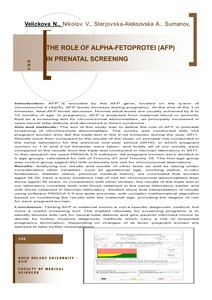Velickova, Nevenka and Nikolov, Vlatko and Sterjovska-Aleksovska, Andrijana and Sumanov, Gorgi (2013) The role of alpha-fetoprotein (AFP) in prenatal screening. In: 3-ти Конгрес на гинеколози и акушери на Македонија, 13-15 May 2013, Ohrid.
![The role of AFP in prenatal screening.jpg [thumbnail of The role of AFP in prenatal screening.jpg]](https://eprints.ugd.edu.mk/7162/1.hassmallThumbnailVersion/The%20role%20of%20AFP%20in%20prenatal%20screening.jpg)

The role of AFP in prenatal screening.jpg
Download (441kB) | Preview
Abstract
Introduction: AFP is encoded by the AFP gene, located on the q-arm of chromosome 4 (4q25). AFP levels increase during pregnancy. At the end of the 1-st trimester, fetal AFP levels decrease. Normal adult levels are usually achieved by 8 to 12 months of age. In pregnancy, AFP is analyzed from maternal blood or amniotic fluid as a screening test for chromosomal abnormalities, as principally increased in open neural tube defects and decreased in Down syndrome.
Aim and methods: The aim of this study was to define the role of AFP in prenatal screening of chromosomal abnormalities. The survey was conducted with 154 pregnant women who did the triple-test in the 2-nd trimester during the year 2011. Results were then compared to the results of the study on prenatal risk conducted in the same laboratory for the previous one-year period (2010), in which pregnant women in 1-st and 2-nd trimester were taken, and finally all of our results were compared to the results from the triple-test conducted in German laboratory in 2011. In this research we used PRISCA 5.0 software. All pregnant women were divided in 5 age groups, calculated for risk of Trisomy 21 and Trisomy 18. The first age group was control group (aged<25) with extremely low risk for chromosomal aberrations.
Results: Analyzing our results and results of other tests as well as taking under consideration other variables, such as gestational age, smoking status, in-vitro fertilization, diabetic status, previous medical history, we concluded that women aged 18-30, have a lower incidence rate of risk for chromosomal abnormalities than those aged>30 years. In comparison with other studies, the results of the triple test in our laboratory correlate both with those obtained in the same laboratory earlier and with those obtained in German laboratory. Studies show that interpretation of results using software PRISCA 5.0 are quite accurate, with complex mathematical algorithm based on combining the results with the maternal age, providing the degree of risk for each pregnant woman.
| Item Type: | Conference or Workshop Item (Poster) |
|---|---|
| Subjects: | Medical and Health Sciences > Basic medicine |
| Divisions: | Faculty of Medical Science |
| Depositing User: | Nevenka Velickova |
| Date Deposited: | 05 Sep 2013 09:40 |
| Last Modified: | 05 Sep 2013 09:40 |
| URI: | https://eprints.ugd.edu.mk/id/eprint/7162 |
